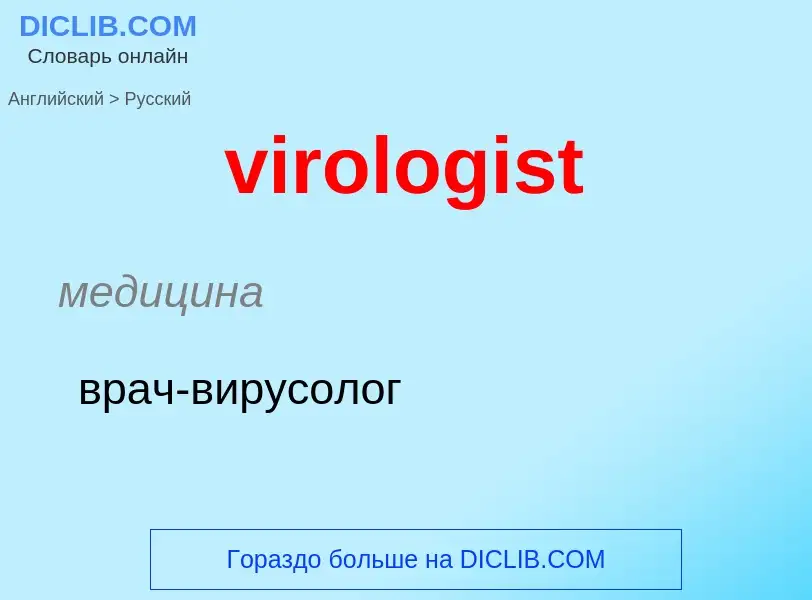Traducción y análisis de palabras por inteligencia artificial ChatGPT
En esta página puede obtener un análisis detallado de una palabra o frase, producido utilizando la mejor tecnología de inteligencia artificial hasta la fecha:
- cómo se usa la palabra
- frecuencia de uso
- se utiliza con más frecuencia en el habla oral o escrita
- opciones de traducción
- ejemplos de uso (varias frases con traducción)
- etimología
virologist - traducción al ruso
медицина
врач-вирусолог
[vai(ə)'rɔlədʒi]
общая лексика
вирусология
существительное
общая лексика
вирусология
Definición
Wikipedia

Virology is the scientific study of biological viruses. It is a subfield of microbiology that focuses on their detection, structure, classification and evolution, their methods of infection and exploitation of host cells for reproduction, their interaction with host organism physiology and immunity, the diseases they cause, the techniques to isolate and culture them, and their use in research and therapy.
The identification of the causative agent of tobacco mosaic disease (TMV) as a novel pathogen by Martinus Beijerinck (1898) is now acknowledged as being the official beginning of the field of virology as a discipline distinct from bacteriology. He realized the source was neither a bacterial nor a fungal infection, but something completely different. Beijerinck used the word "virus" to describe the mysterious agent in his 'contagium vivum fluidum' ('contagious living fluid'). Rosalind Franklin proposed the full structure of the tobacco mosaic virus in 1955.
Virology began when there were no methods for propagating or visualizing viruses or specific laboratory tests for viral infections. The methods for separating viral nucleic acids (RNA and DNA) and proteins, which are now the mainstay of virology, did not exist. Now there are many methods for observing the structure and functions of viruses and their component parts. Thousands of different viruses are now known about and virologists often specialize in either the viruses that infect plants, or bacteria and other microorganisms, or animals. Viruses that infect humans are now studied by medical virologists. Virology is a broad subject covering biology, health, animal welfare, agriculture and ecology.



![Polyacrylamide gel electrophoresis of [[rotavirus]] proteins stained with Coomassie blue Polyacrylamide gel electrophoresis of [[rotavirus]] proteins stained with Coomassie blue](https://commons.wikimedia.org/wiki/Special:FilePath/Coomassie blue stained gel.png?width=200)
![Caesium chloride (CsCl) solution and two morphological types of [[rotavirus]]. Following centrifugation at 100 g a density gradient forms in the CsCl solution and the virus particles separate according to their densities. The tube is 10 cm tall. The viruses are the two "milky" zones close together.<ref name="pmid6290520"/> Caesium chloride (CsCl) solution and two morphological types of [[rotavirus]]. Following centrifugation at 100 g a density gradient forms in the CsCl solution and the virus particles separate according to their densities. The tube is 10 cm tall. The viruses are the two "milky" zones close together.<ref name="pmid6290520"/>](https://commons.wikimedia.org/wiki/Special:FilePath/CsCl density gradient centrifugation.jpg?width=200)


![[[Martinus Beijerinck]] in his laboratory in 1921 [[Martinus Beijerinck]] in his laboratory in 1921](https://commons.wikimedia.org/wiki/Special:FilePath/Martinus Willem Beijerinck in his laboratory.jpg?width=200)


![Immunoflourescence: Cells infected by [[rotavirus]] (top) and uninfected cells (bottom) Immunoflourescence: Cells infected by [[rotavirus]] (top) and uninfected cells (bottom)](https://commons.wikimedia.org/wiki/Special:FilePath/Virus Infected Cells.jpg?width=200)
